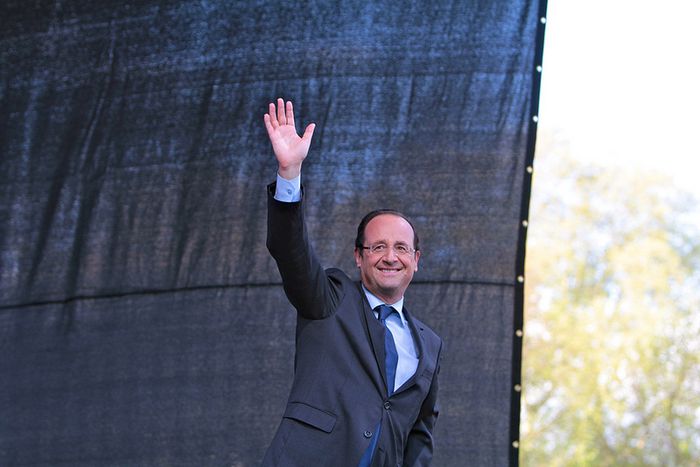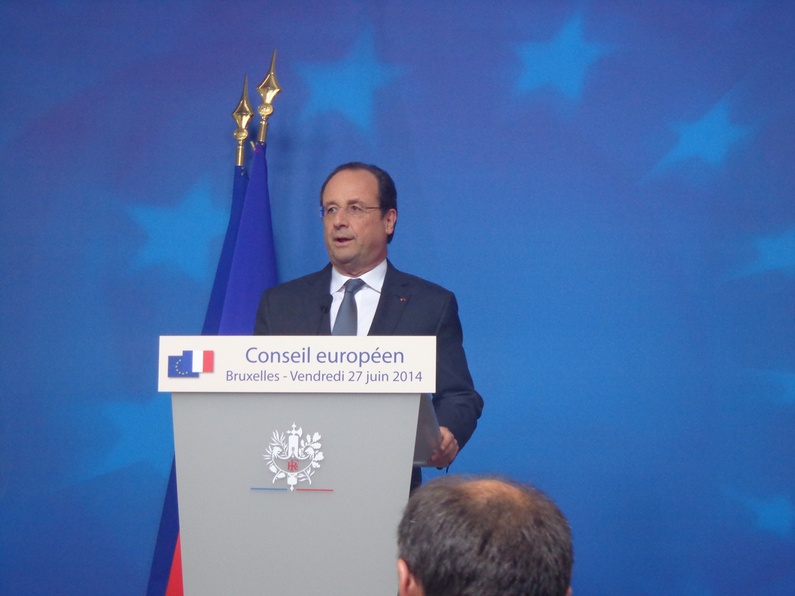
François Hollande positive at the european summit
Published on
Translation by:
Abigail WatsonAt 6.30 p.m. on 27th June, François Hollande held a press conference to take stock of the European summit which named Jean-Claude Juncker as the head of the European Commission. He gives his thoughts on the topic, explaining this nomination and the mandate which has been entrusted to the new head of the EU executive.
"This is an important Council"; so begins François Hollande's speech. After alluding to the peace that is now reigning on the European continent, he stresses the importance of Jean-Claude Juncker's nomination, drawing attention to the mandate with which he has been entrusted. In addition, the different heads of State also discussed other subjects such as the preparation underway for the climate conference which will take place in Paris at the end of 2015 and the situation in Ukraine, as well as the desire to launch a global immigration policy 'to protect Europe's borders.'
Let's start by revisiting Ukraine: the French President drew attention to the progress achieved by the summit as well as the important role played by the the French-German parternship in the decision making process, in particular by creating 'guarantees on effective implementation'. François Hollande has given himself a pat on the back on numerous occassions and seems determined to take charge of defusing the Ukraine situation and to see this project though to the end.
 As regards the nomination of Jean-Claude Juncker, it is, in the eyes of François Hollande, a completely logical choice; 'we respected the letter and the spirit of the the treaties'. He goes on to stress that 'David Cameron was in a delicate position', and the French President does not mince his words: 'there was no choice when it came to the candidate; the party which came first would have the right to name the candiate of the next Commission'. He is therefore indirectly condemning the position of the British Prime Minister by stressing that it was not a legitimate one. In terms of the mandate with which the new president has been entrusted, François Hollande is of the opinion that it is the most important point of the Council. In his speech, he notably went on to underline the different target priorities: in first place, growth and employment, with the French President counting on 'the implementation of the SGP (Stability and Growth Pact) and its full flexibility'. The second priority is support for investments: The European Union must 'mobilise its financial resources to invest in infrastructure, in support for SMEs', which would require making use of the EIB (European Investment Bank), Structural Funds and project bonds. Thirdly, François Hollande focused on employment for young people, with a good number of promises such as, for example, greater financial committment. Let's just hope that this turns out to be the case. Next up was common energy policy, considered essential in today's climate in light of competitivity constraints. Finally, the most delicate subject of all: immigration policy. The Council wants a truly global immigration policy, 'more coordination and a proactive approach are needed', stresses François Hollande. He appears satisfied with the mandate and optimistic about these priorities; it remains to be seen whether this positive attitude will last.
As regards the nomination of Jean-Claude Juncker, it is, in the eyes of François Hollande, a completely logical choice; 'we respected the letter and the spirit of the the treaties'. He goes on to stress that 'David Cameron was in a delicate position', and the French President does not mince his words: 'there was no choice when it came to the candidate; the party which came first would have the right to name the candiate of the next Commission'. He is therefore indirectly condemning the position of the British Prime Minister by stressing that it was not a legitimate one. In terms of the mandate with which the new president has been entrusted, François Hollande is of the opinion that it is the most important point of the Council. In his speech, he notably went on to underline the different target priorities: in first place, growth and employment, with the French President counting on 'the implementation of the SGP (Stability and Growth Pact) and its full flexibility'. The second priority is support for investments: The European Union must 'mobilise its financial resources to invest in infrastructure, in support for SMEs', which would require making use of the EIB (European Investment Bank), Structural Funds and project bonds. Thirdly, François Hollande focused on employment for young people, with a good number of promises such as, for example, greater financial committment. Let's just hope that this turns out to be the case. Next up was common energy policy, considered essential in today's climate in light of competitivity constraints. Finally, the most delicate subject of all: immigration policy. The Council wants a truly global immigration policy, 'more coordination and a proactive approach are needed', stresses François Hollande. He appears satisfied with the mandate and optimistic about these priorities; it remains to be seen whether this positive attitude will last.
The speech comes to an end with a message intended for David Cameron, touching upon his vision of Europe. François Hollande seems understanding of the fact that Europe must evolve and become multi-speed in nature, but at the same time he condemns the United Kingdom's desire to distance itself from the European Union, pointing out that even if the former's interests have 'not (been) respected' this time, there is no right to a veto, and no fundamental interest. Finally, his closing words are again marked by the same optimism: 'A more active, more protective, more united Europe; this message has been incorporated into the mandate.'
Now it's over to the journalists, get ready Monsieur Hollande! Even though the President got away with producing some high-class waffle in answer to most of the questions put to him by the journalists, some information nevertheless managed to slip out. Between the promises about the fight against unemployment, the future relationship between the EU and the United Kingdom, the flexibility of the SGP, the issue of a 'super commissioner' and the future make-up of the Commission, the journalists had a field day. We can be sure that the composition of the Commission is being kept secret, and will remain so until the last minute. The jockeying for position can therefore begin to determine who will have the main General Delegations. But we also know that 'the battle against unemployment is the only priority that can be understood to be a major one', and that "there will never be talk of the legalisation of surrogacy during my presidency'. Because, of course, these issues remain central during a press conference at the European Council.
Translated from François Hollande positive au Sommet Européen



